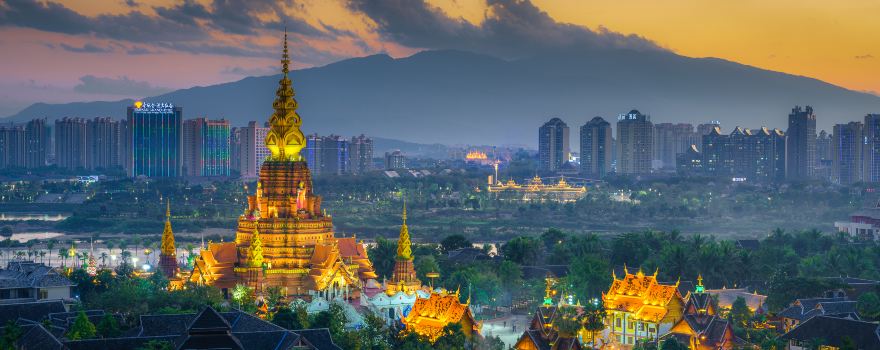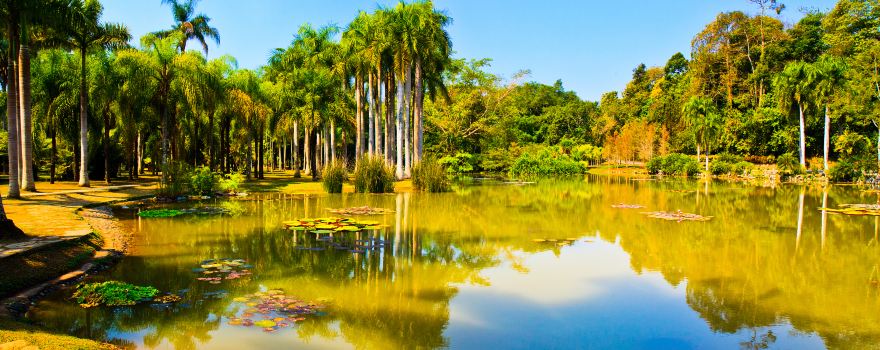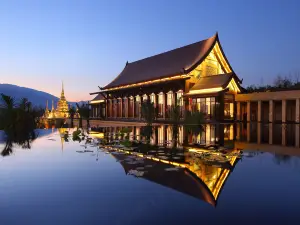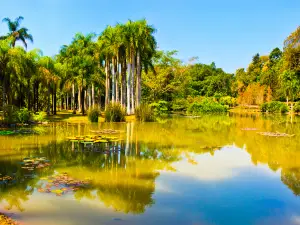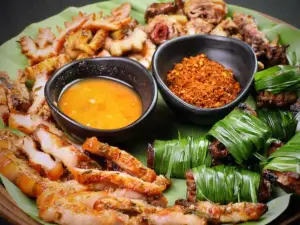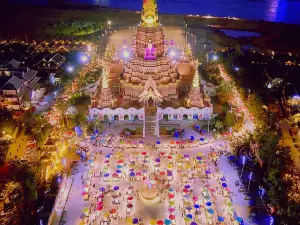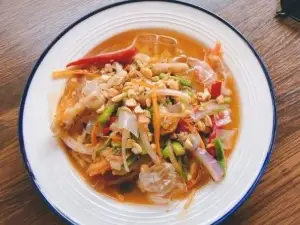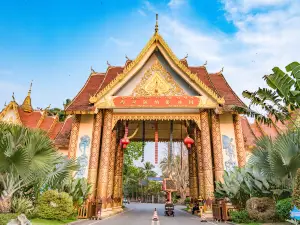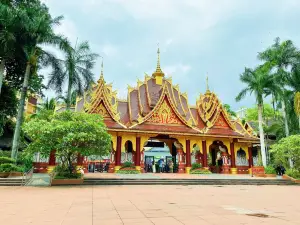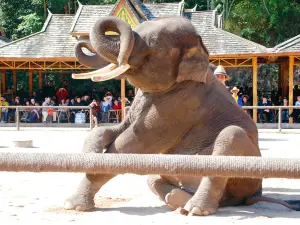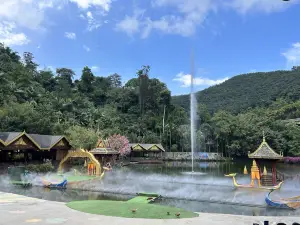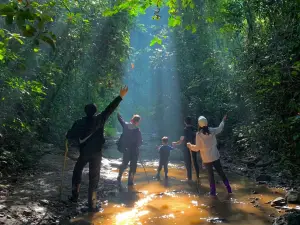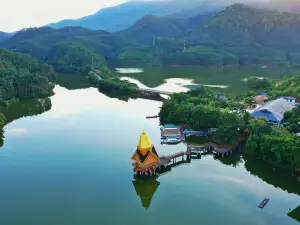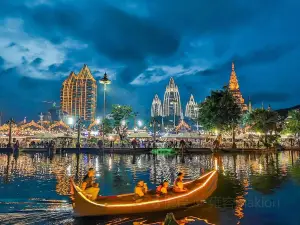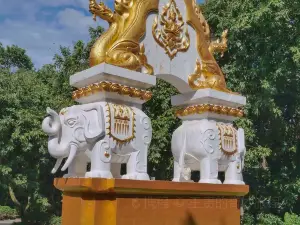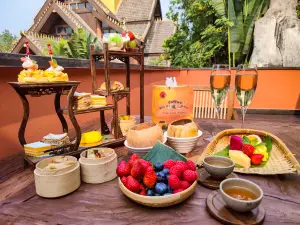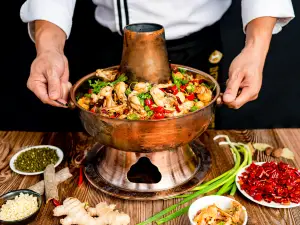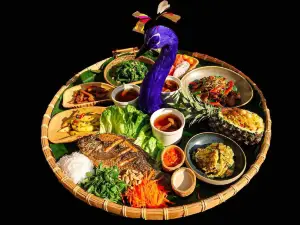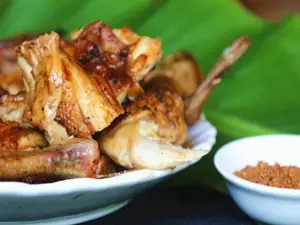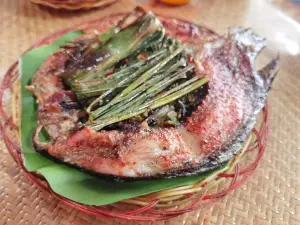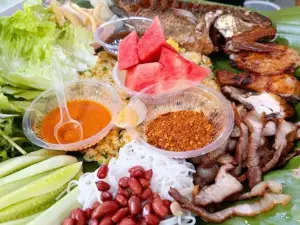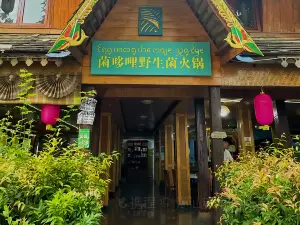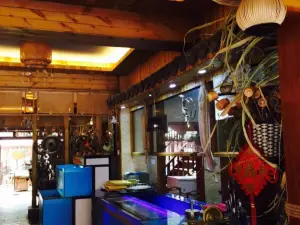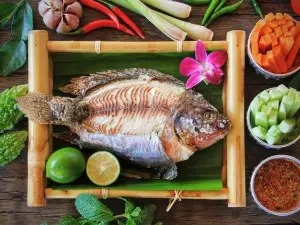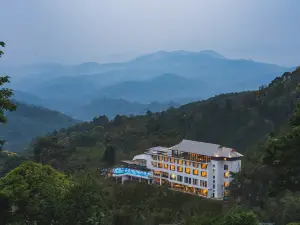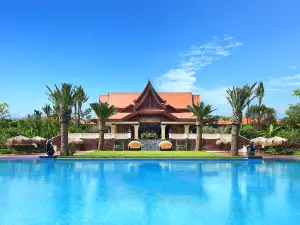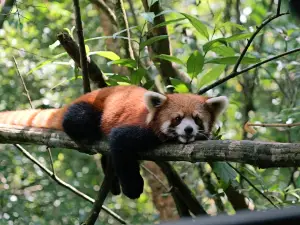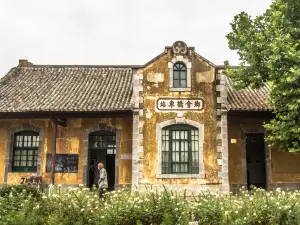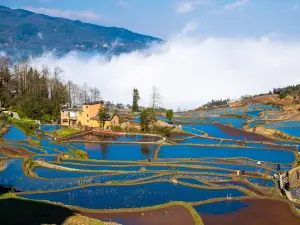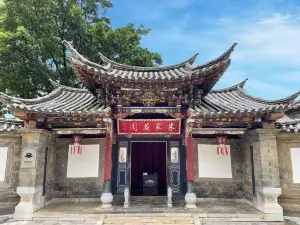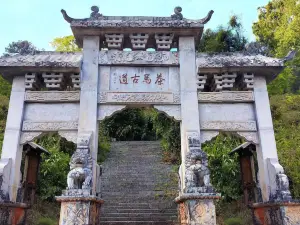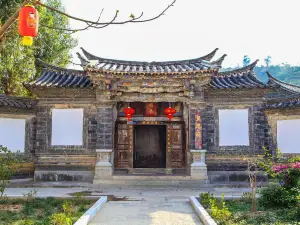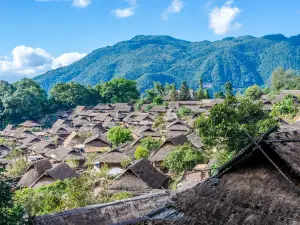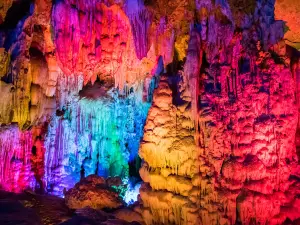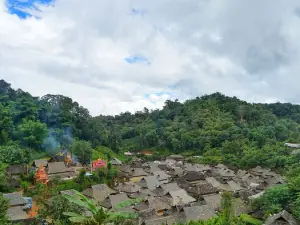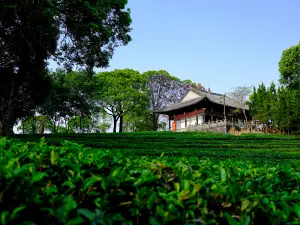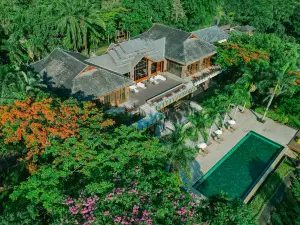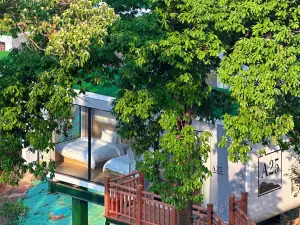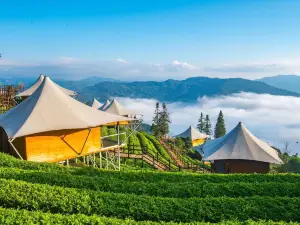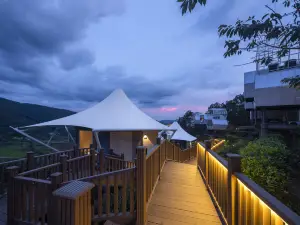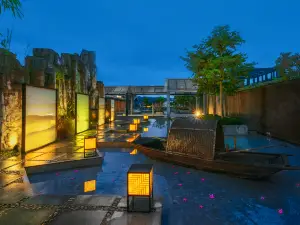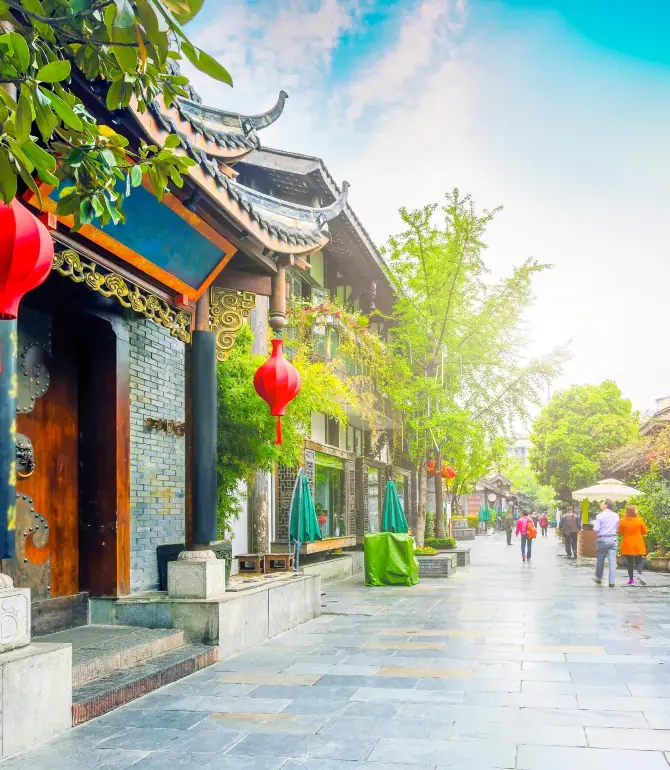Things to Do in Xishuangbanna in 2025 - Top Attractions, Local Food, Hotels & Travel Tips (Updated June, 2025) | Trip.com
About Xishuangbanna
Recommended trip: 3–4 day(s)
Recommended trip: 3–4 day(s)Current Weather Conditions
Xishuangbanna Local Experiences Map

Trending in Xishuangbanna
Xishuangbanna Local Travel Guide 2025
Xishuangbanna Brief Guide
Xishuangbanna is a famous tourism location in Yunnan, known for its magical rainforest landscape and unique ethnic customs. Xishuangbanna is the home of the Dai people. Because it is close to Buddhist countries like Thailand and Myanmar, the Dai people are generally devoted Buddhist believers. Xishuangbanna is dotted with Southeast Asian Buddhist temples and pagodas. It is also a kingdom for natural life, with a wide variety of animal and plant resources, many of which are rare and endangered species. Every year in April, the Dai celebrate their version of Water Splashing Festival. This is an experience unlike any other and attracts visitors from all over the world to join in and experience the fun.
Xishuangbanna Must-try Local Experiences
1. Explore the Wonders of Xishuangbanna's Natural Beauty Discover the serenity of the Botanical Garden, cruise the Lancang River, and visit Manting Park for a spiritual experience. Don't miss the Wild Elephant Valley to see wild Asian elephants up close. 2. Discover the Dai Garden Explore the Dai Garden to learn about the culture and traditions of the Dai people through traditional architecture, cultural performances, and beautiful gardens. 3. Experience the Vibrant Culture of the Dai People Visit traditional Dai villages to witness their unique architecture, try on colorful clothing, and enjoy traditional dance performances. Engage in traditional Dai weaving to learn about this ancient craft. 4. Explore the Gaozhuang Night Market Wander through the Gaozhuang Night Market to experience local culture, try specialty street food, and shop for unique handicrafts. 5. Celebrate the Water Splashing Festival Join the Water Splashing Festival in mid-April to celebrate the Dai New Year with water splashing, parades, and cultural performances. 6. Savor the Flavors of Dai Cuisine Indulge in Dai cuisine with dishes like pineapple rice and Lemongrass Grilled Fish. Don't forget to sample the local pu'er tea. 7. Discover Unique Treasures at Local Markets Explore Xishuangbanna's local markets for handicrafts, souvenirs, and local street food. Visit the morning market for fresh produce and local products. 8. Capture the Beauty of the Tropical Botanical Garden Take stunning photos at the Xishuangbanna Tropical Botanical Garden, featuring diverse tropical plants and lush landscapes. 9. Photograph the Wild Elephants Capture unforgettable shots of wild Asian elephants at the Wild Elephant Valley, a unique opportunity to photograph these majestic animals. 10. Snap Pictures at Manting Park Capture the serene beauty of Manting Park with its picturesque gardens, historical sites, and tranquil atmosphere. 11. Embrace the Tranquility of a Tea Plantation Find serenity at a tea plantation, learn about tea cultivation, and enjoy a traditional tea ceremony with freshly brewed pu'er tea. 12. Relax in a Traditional Dai Spa Indulge in a traditional Dai spa experience with herbal baths, massages, and other relaxing treatments using local ingredients. 13. Join a Jungle Trekking Tour Embark on a jungle trekking tour to explore Xishuangbanna's rainforests, encountering exotic plants, wildlife, and beautiful scenery.
Xishuangbanna Must-see Attractions
Xishuangbanna offers a diverse range of attractions from tropical botanical gardens with extensive plant diversity and botanical research, historic parks narrating Dai cultural traditions and customs, to natural reserves like Wild Elephant Valley and Xishuangbanna Primeval Forest Park where visitors can witness wildlife and participate in ethnic festivals, providing a comprehensive insight into both ecological wonders and rich cultural heritage.
Xishuangbanna Food Guide
Xishuangbanna's cuisine is celebrated for its distinctive flavors and varied culinary methods. Techniques like the use of herbs and roasting enhance not only the taste but also the regional distinctiveness of the dishes. Examples such as the sweet and tangy pineapple purple rice, the aromatic lemongrass-grilled fish, and the refreshing lemon jelly highlight the seamless integration of local ingredients with traditional cooking techniques.
Xishuangbanna Transportation
Xishuangbanna's transportation infrastructure is well-developed, with Xishuangbanna Gasa International Airport and the long-distance bus stations being the primary gateways for intercity travel. Xishuangbanna Gasa International Airport (IATA: JHG, ICAO: ZPJH) is a key aviation hub located approximately 6 km from Jinghong City. It operates a wide range of domestic flights to major Chinese cities and international flights to Southeast Asian destinations. The long-distance bus stations in Jinghong City, such as Jinghong Bus Station and Jinghong South Bus Station, provide extensive bus services to various provincial and inter-provincial destinations, as well as international routes to Laos and Myanmar. Jinghong Bus Station, in particular, is the largest and offers the most comprehensive services, including international, inter-provincial, and intra-provincial lines. To reach Jinghong City from these bus stations, travelers can use city bus routes or taxis, with the bus station being well-connected to the local transportation network.
Xishuangbanna Where to Stay
Xishuangbanna is known for its vibrant accommodation scene located primarily in Jinghong, its major urban center. Travelers can find various accommodations ranging from upscale hotels in the downtown areas to quaint guesthouses near cultural sites. The region offers a unique blend of city comfort and cultural immersion.
Xishuangbanna Best Time To Visit
The best time to visit Xishuangbanna is from November to April during the dry season. This period offers warm and pleasant weather, ideal for exploring the region's tropical scenery and cultural attractions. April is particularly noteworthy as it hosts the Water Splashing Festival, a significant local event. Additionally, the dry season's sunny days and lower humidity provide comfortable conditions for travel. For those interested in experiencing the local tropical fruits, the rainy season from June to September is also recommended.
Xishuangbanna Travel Tips
1. Respect Local Ethnic Cultures: During significant local festivals like the Dai New Year (Water Splashing Festival), you are welcome to join in and enjoy the festivities, but please remember to respect local customs. 2. Dietary Preferences: The locals enjoy food with sour and spicy flavors. It’s recommended that visitors familiarize themselves with these preferences in advance to avoid discomfort. 3. Prevent Insect Bites: There are many mosquitoes in the tropical rainforest of Xishuangbanna. Visitors are advised to carry mosquito repellent to avoid bites. 4. Be Cautious Around Wildlife: When exploring forests or visiting wildlife reserves, refrain from touching or feeding animals. Maintain a safe distance, follow staff instructions, and respect nature for both your safety and environmental preservation. 5. Respect Local Religious Culture: Some temples in Xishuangbanna do not allow photography inside. When visiting temples, be mindful of your attire—sleeveless tops, skirts, and shorts are not permitted, and sunglasses and hats should be removed before entering the temple.
Xishuangbanna Useful Guide
Xishuangbanna is a culturally rich region in Yunnan. Dai language is the local language. Mandarin Chinese is also widely used, facilitating communication for tourists. Translation services may not be as developed as in major cities, but Mandarin and Chinese apps can aid visitors. The presence of multiple languages reflects the area's ethnic diversity and cultural ties with Southeast Asian neighbors. When language barriers arise, non-verbal communication like gestures can be helpful.
Trip.Best: Xishuangbanna
Things to do in Xishuangbanna
What to Do
Manting Park
Xishuangbanna Dai Garden
Xishuangbanna Folk Custom Garden
Where to Stay
What to Eat
InterContinental Xishuangbanna Resort manlinxuanzhongzanting
Xishuangbanna Moments: Through Travelers' Eyes

The Maldives Blue photo spot in Xishuangbanna

This amazing hidden gem of a hotel in Xishuangbanna is a must-see!!

I didn't go to Bali!! But found my dream hotel in Xishuangbanna...

Unlocking vacation mode in Xishuangbanna with a hotel stay!

Regret not seeing this guide before going to Xishuangbanna

Xishuangbanna Day Trip Guide

Hidden among tea mountains, sleeping under the stars

Finally found my dream hotel in Xishuangbanna!
Best of Xishuangbanna
Site Operator: Trip.com Travel Singapore Pte. Ltd.
